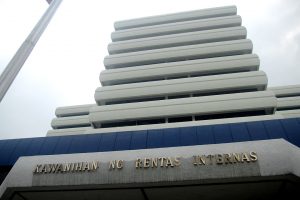The youth and trust in the elections

A MAN double checks his election return after casting his vote on May 9. — PHILIPPINE STAR/ MIGUEL DE GUZMAN
It’s been about 19 hours since the close of most voting precincts as we write this column on Tuesday afternoon, May 10. As we write this column, there are reports of both belief in the “partial, unofficial returns” and the possibility of Marcos becoming president on one hand, and denunciations of the results of the presidential and vice-presidential tallies as unbelievable and inconsistent with ordinary human experience, on the other. One of the reasons for the difficulty of some accepting a Marcos Jr. presidency is that up to now, the only son of Marcos Sr. had not explained the details of his program of unity.
A great number of perceptive people have been asking what the word “unity” means and how it will be operationalized. It has to be spelled out in clearer terms so that it does not remain just a strategy that his campaign strategists advised him should be his message. Candidate Marcos refused to join presidential debates where some details of each aspirant’s program could be discussed and where each candidate could answer the issues raised against him/her.
There is therefore a lot of uncertainty and anxiety. This feeling of grave concern is probably mirrored in a Viber post sent in the wee hours of Tuesday by a very successful Philippine-born Filipino-Chinese businessman of parents who migrated from the Chinese mainland. The businessman lived most of his life in the Philippines, went to Philippine schools, conducted business with other Filipinos, and generally knows the Filipino psyche and the country’s principal business and political players. One thing that stands out about this friend is that he has always maintained that the most important priority is the economy and all other concerns are second to that. His comment: “The war of the pink vs red will now start. It will be very unpleasant for all of us economically. If the pink can raise that many people at Ayala, what is to prevent them from doing it again? With all the heavy baggage of BBM, it will be very easy to find a national issue and create EDSA 3. His estate tax, past sins of the father (for which he is) not accountable. He is totally unacceptable to some groups.”
The comment, of course, assumes that the election stakeholders trust the election results as more and more people start to question the processes and its technological underpinnings.
Just a few hours ago, we saw quite a number of youth groups demonstrating in front of the Commission on Elections (Comelec) offices in Manila and Cebu. I suspect that these protest actions and their variants will continue indefinitely and will even escalate as these protests transform themselves into a movement and wage street demonstrations reminiscent of the post-Ninoy Aquino execution. As pointed out by my friend, it’s easy for those who feel aggrieved to gather a million people. These protests could continue until there are clear explanations of the workings of the automated election system which are unfortunately not easily comprehensible for many not technically inclined. What makes any explanation challenging is that all of the processes inside the computers and machines are unseen.
Unless a detailed and truthful explanation is made, the unity that is being bandied about will be hard to come by, especially in an environment of partisanship and the desire of the youth for clean elections. Points have been raised about either statistical improbability or coincidence: the ratio of votes between Marcos Jr. and Vice-President Leni Robredo is uniform in many regions and provinces, even at the various different moments of reporting. It has been pointed out that if one was to track this reporting, it’s strangely a straight line all throughout the reporting period.
While Marcos Jr.’s call for unity has not been followed by any attempt to reach out to those in the various opposing camps, the Vice-President issued a statement on election day that essentially emphasizes that. “I am aware of the many questions that remain unanswered (about the election count and results). We have been consulting experts who can extensively study all the allegations and posts in social media. At 5:30 p.m., a Mass will be held in Naga. I will be there to express my gratitude to my province-mates. On May 13, a gathering in Manila will be held so I can thank all our campaign volunteers. I will be there. We will announce details of the gathering shortly.”
While analyses are being conducted on the honesty and accuracy of the automated elections, far more discussions are being generated by the Marcos campaign strategy which was launched in 2016 when he ran and lost for vice-president against Leni Robredo. Some say the Marcos Jr. campaign started in 2010 with Cambridge Analytica and some of its ex-personnel designing the strategy. The overall campaign strategy was to rehabilitate the Marcos era as the “golden age” of Philippine history while vilifying EDSA, Ninoy Aquino, and pro-democracy forces. Duterte and the president’s information structure also had the same tactic of belittling EDSA and thus helped the Marcoses without even mentioning the Junior as a potential presidential candidate. Certain business groups and political dynasties aided this effort, working with mainstream and social media.
Some have chosen to go beyond the results of the elections, campaign strategies, messaging, organizing at the grassroots, and are questioning our electoral system as an option for effecting change, the process having been coopted by the oligarchs and dynasties working in lockstep with so many other institutions (ironically, the same ones needed for a healthy and honest democracy) including media, the courts, etc. One such commentator is Vergel Santos and here’s what he has to say the day after the elections:
“The future has been coopted. Elections have become a joke which is the culmination of the entire system of governance. A convict for president, not to mention the number one senator — what can we expect? The prospect of a government conspiring against us. All this is a consequence of defaults across the generations. We ourselves have all but lost our chances to redeem ourselves. The young are on their own and will have to claim their future for themselves: they will have to establish an alternative people power institution imposing what sanctions they can on the unrighteous, self-installed dynastic official power. I don’t know that elections are a fair option now.”
Santos’s words show particular concern for our youth who are either the children or grandchildren of veterans of the 1986 uprising. These youth showed up in droves as volunteers in campaign rallies. They are the raw material for a massive movement that could provide alternatives and the sanctions that Santos talks about.
This early the international and local business community have reacted to the uncertainty. It is imperative that trust in the elections be established. Lack of trust in the reliability (not just the accuracy) of the results could lead to long-term instability and frightening consequences that do not benefit the majority.
Philip Ella Juico’s areas of interest include the protection and promotion of democracy, free markets, sustainable development, social responsibility and sports as a tool for social development. He obtained his doctorate in business at De La Salle University. Dr. Juico served as secretary of Agrarian Reform during the Corazon C. Aquino administration.




